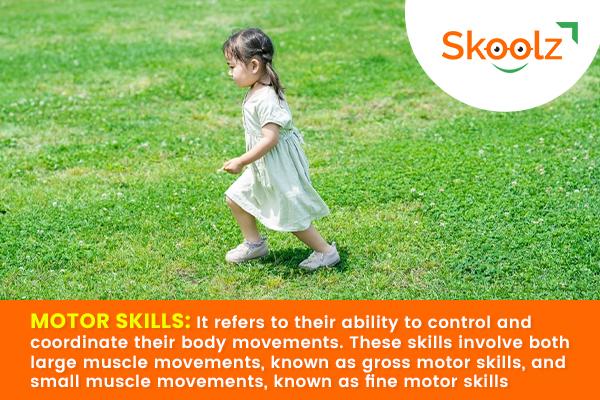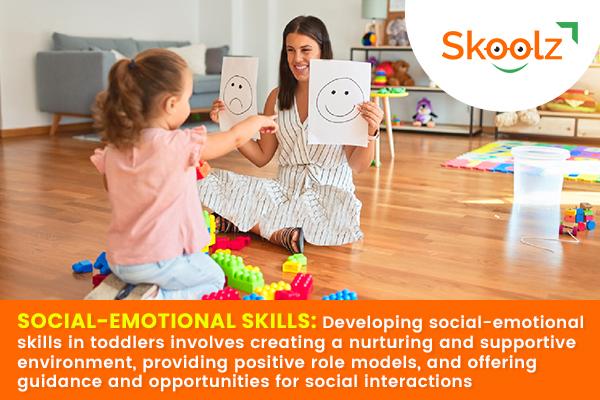
What are the Development Skills Related to Toddlers and How to Develop them
What are the Development Skills Related to Toddlers, and How to Develop them?
Regarding toddler development, children typically develop several key skills during this stage. These skills encompass various areas of development, including cognitive, language, motor, and social-emotional skills. Here are some of the primary development skills related to toddlers:
1. Cognitive Skills:
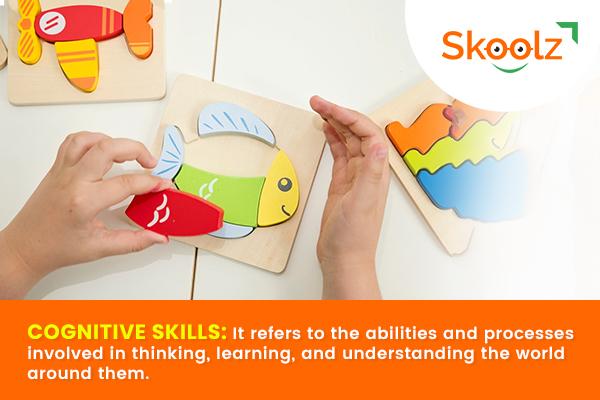
- Object permanence: Understanding that objects continue to exist even when they are out of sight.
- Cause and effect: Recognizing that certain actions can cause specific outcomes.
- Problem-solving: Attempting to find solutions to simple problems or challenges.
- Symbolic play: Engaging in pretend play and using objects to represent something else.
2. Language Skills:
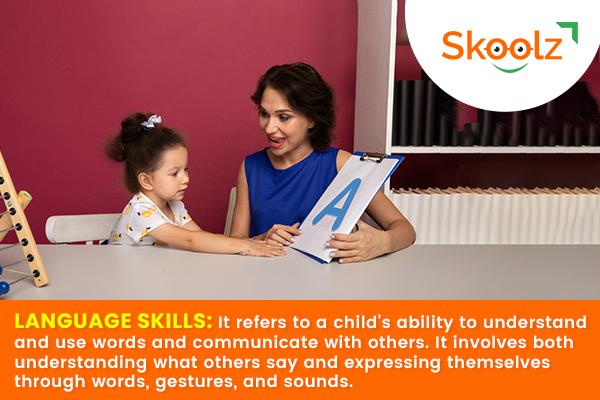
- Vocabulary expansion: Increasing their repertoire of words and starting to form short sentences.
- Language comprehension: Understanding and following simple instructions or questions.
- Gestures and non-verbal communication: Using gestures, pointing, and other non-verbal cues to express themselves.
3. Motor Skills:
- Gross motor skills: Developing coordination and balance for activities like walking, running, jumping, and climbing.
- Fine motor skills: Gaining control over smaller muscles for tasks such as holding a spoon, stacking blocks, or scribbling.
4. Social-Emotional Skills:
- Social interaction: Beginning to show interest in and interact with other children and adults.
- Empathy: Showing some understanding of others' feelings and demonstrating basic empathy.
- Self-regulation: Learning to manage and express emotions in appropriate ways, such as frustration or excitement.
- Independence: Attempting to do things on their own, like dressing themselves or feeding.
5. Sensory Skills:
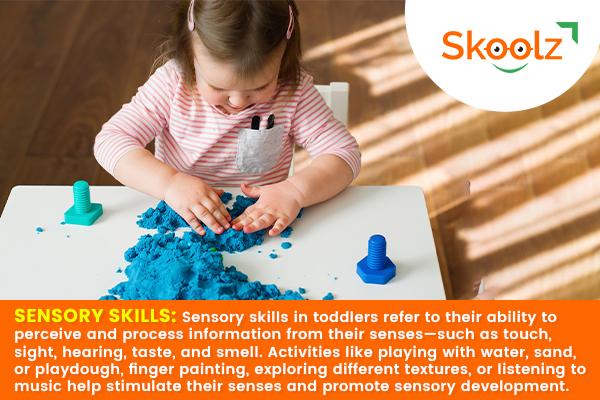
- Sensory exploration: Engaging with various textures, sounds, tastes, and smells to stimulate the senses.
- Hand-eye coordination: Developing the ability to coordinate hand movements with visual input, such as catching or throwing a ball.
It's important to note that every child develops at their own pace, so there can be variations in the timing and progression of these skills. However, if you have concerns about your child's development, it's best to consult with a pediatrician or early childhood specialist for a comprehensive assessment.
How to Develop Various Skills in Toddlers?
Developing skills in toddlers involves creating a supportive environment and providing opportunities for them to explore, learn, and practice different abilities. Here are some strategies to help develop various skills in toddlers:
1. Cognitive Skills:
- Provide age-appropriate toys and games that encourage problem-solving, such as shape sorters or puzzles.
- Engage in simple cause-and-effect activities, like pressing buttons to activate lights or sounds.
- Read books together and encourage your toddler to point at pictures and identify objects.
2. Language Skills:
- Talk and interact with your child frequently, using simple and clear language.
- Read aloud to your toddler regularly to expose them to a variety of words and sentence structures.
- Respond to their attempts at communication, expanding on their words or sentences.
3. Motor Skills:
- Offer toys and activities that promote both gross motor and fine motor skills, such as balls, building blocks, or finger painting.
- Create safe spaces where your toddler can practice physical activities like climbing, crawling, and running.
- Encourage self-help skills like dressing themselves or using utensils for feeding.
- Arrange playdates or opportunities for your toddler to interact with other children their age.
- Model positive social behaviors and emotional expression.
- Encourage sharing, taking turns, and empathy through gentle guidance and reinforcement.
5. Sensory Skills:
- Provide a variety of sensory experiences, such as water play, sand play, or exploring different textured materials.
- Encourage sensory exploration through activities like finger painting, playing with playdough, or sensory bins.
6. Play and Exploration:
- Allow unstructured playtime where your child can explore and use their imagination freely.
- Provide a safe and stimulating environment with age-appropriate toys, books, and materials.
- Support their curiosity by answering their questions and engaging in their play.
Remember, each child develops at their own pace, so be patient and provide a supportive and nurturing environment. Celebrate your toddler's progress and offer encouragement and positive reinforcement along the way.
 Written by:
Written by:
Bhawana Mohane
Digital Marketer

What are the Development Skills Related to Toddlers, and How to Develop them?
Regarding toddler development, children typically develop several key skills during this stage. These skills encompass various areas of development, including cognitive, language, motor, and social-emotional skills. Here are some of the primary development skills related to toddlers:
1. Cognitive Skills:

- Object permanence: Understanding that objects continue to exist even when they are out of sight.
- Cause and effect: Recognizing that certain actions can cause specific outcomes.
- Problem-solving: Attempting to find solutions to simple problems or challenges.
- Symbolic play: Engaging in pretend play and using objects to represent something else.
2. Language Skills:

- Vocabulary expansion: Increasing their repertoire of words and starting to form short sentences.
- Language comprehension: Understanding and following simple instructions or questions.
- Gestures and non-verbal communication: Using gestures, pointing, and other non-verbal cues to express themselves.
3. Motor Skills:
- Gross motor skills: Developing coordination and balance for activities like walking, running, jumping, and climbing.
- Fine motor skills: Gaining control over smaller muscles for tasks such as holding a spoon, stacking blocks, or scribbling.
4. Social-Emotional Skills:
- Social interaction: Beginning to show interest in and interact with other children and adults.
- Empathy: Showing some understanding of others' feelings and demonstrating basic empathy.
- Self-regulation: Learning to manage and express emotions in appropriate ways, such as frustration or excitement.
- Independence: Attempting to do things on their own, like dressing themselves or feeding.
5. Sensory Skills:

- Sensory exploration: Engaging with various textures, sounds, tastes, and smells to stimulate the senses.
- Hand-eye coordination: Developing the ability to coordinate hand movements with visual input, such as catching or throwing a ball.
It's important to note that every child develops at their own pace, so there can be variations in the timing and progression of these skills. However, if you have concerns about your child's development, it's best to consult with a pediatrician or early childhood specialist for a comprehensive assessment.
How to Develop Various Skills in Toddlers?
Developing skills in toddlers involves creating a supportive environment and providing opportunities for them to explore, learn, and practice different abilities. Here are some strategies to help develop various skills in toddlers:
1. Cognitive Skills:
- Provide age-appropriate toys and games that encourage problem-solving, such as shape sorters or puzzles.
- Engage in simple cause-and-effect activities, like pressing buttons to activate lights or sounds.
- Read books together and encourage your toddler to point at pictures and identify objects.
2. Language Skills:
- Talk and interact with your child frequently, using simple and clear language.
- Read aloud to your toddler regularly to expose them to a variety of words and sentence structures.
- Respond to their attempts at communication, expanding on their words or sentences.
3. Motor Skills:
- Offer toys and activities that promote both gross motor and fine motor skills, such as balls, building blocks, or finger painting.
- Create safe spaces where your toddler can practice physical activities like climbing, crawling, and running.
- Encourage self-help skills like dressing themselves or using utensils for feeding.
- Arrange playdates or opportunities for your toddler to interact with other children their age.
- Model positive social behaviors and emotional expression.
- Encourage sharing, taking turns, and empathy through gentle guidance and reinforcement.
5. Sensory Skills:
- Provide a variety of sensory experiences, such as water play, sand play, or exploring different textured materials.
- Encourage sensory exploration through activities like finger painting, playing with playdough, or sensory bins.
6. Play and Exploration:
- Allow unstructured playtime where your child can explore and use their imagination freely.
- Provide a safe and stimulating environment with age-appropriate toys, books, and materials.
- Support their curiosity by answering their questions and engaging in their play.
Remember, each child develops at their own pace, so be patient and provide a supportive and nurturing environment. Celebrate your toddler's progress and offer encouragement and positive reinforcement along the way.
 Written by:
Written by:
Bhawana Mohane
Digital Marketer


